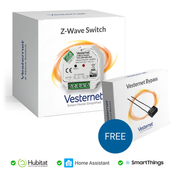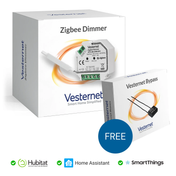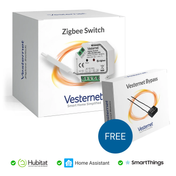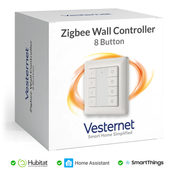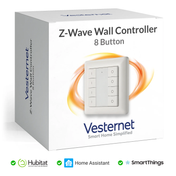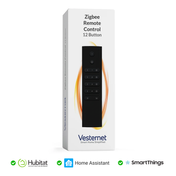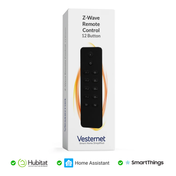Imagine the convenience of unlocking your front door without fumbling for keys, or granting access to a service provider without having to be physically present. This is the world of smart locks - a world where keyless access and enhanced security are at your fingertips. In this blog post, we will explore the ins and outs of smart locks, from their basic functions to advanced features, and how they can revolutionize the way you secure your home.
If you want to learn more about the benefits of smart locks, how smart locks work, and the different types available, you’re in the right place. We’ll also discuss how to secure your smart lock effectively and provide recommendations on some of the best smart locks on the market today.
Short Summary
-
Smart locks offer enhanced safety and convenience through the combination of mechanical locks, digital keys, and interfaces.
-
Keyless door locks provide secure Wi-Fi connections, software updates, remote electronic control of their lock for improved safety & convenience.
-
Secure your smart lock by securing your Wi-Fi connection & regularly updating its software to maximize security & home safety.
Understanding Smart Locks: The Basics
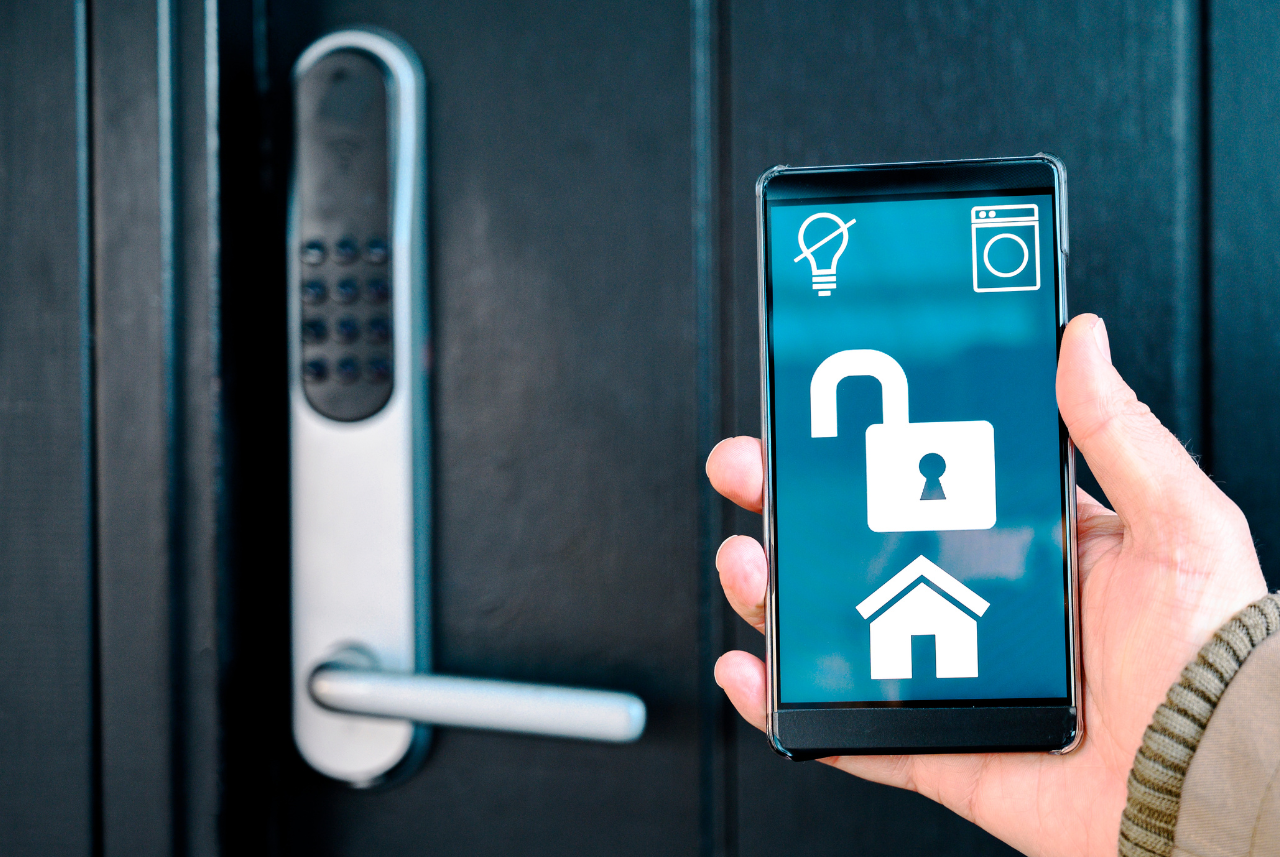
Smart locks are keyless door locks that provide convenience and security by allowing users to control access through a smartphone app or other connected devices. The essential components of a smart lock consist of the mechanical lock, the interface, and the digital keys. Most smart locks offer a range of benefits, including enhanced safety and convenience through the ability to control access via a smartphone app or other connected devices.
So, how do smart locks work? They combine mechanical locks, digital keys, and interfaces to provide access control. Indeed, smart locks provide the same level of security as traditional locks, while offering the added convenience of not having to fumble with a key once the smart lock is installed.
However, potential drawbacks of utilizing a smart lock include worries about hackability and the potential for a breach that could allow someone to access and control the lock through the home’s Wi-Fi. But fear not, as many smart locks have security measures in place to prevent such issues.
Keyless Door Locks
Keyless door locks are a type of lock that utilizes alternative methods such as a keypad, fingerprint, or smartphone app to grant access, eliminating the need for a physical key. This modern approach to securing your home brings a wealth of benefits, including increased convenience and enhanced security as they can be programmed to only grant access to authorized individuals.
To ensure the security of keyless door locks, users should utilize a secure Wi-Fi connection, consistently update the software, and establish strong passwords, especially for their front door. Say goodbye to the hassle of carrying keys and embrace the future of home security with keyless door locks.
How Smart Locks Connect
Smart locks are equipped with Wi-Fi, 4G, and Bluetooth connectivity, which can help smart locks improve safety and convenience for users. They are capable of:
-
Connecting to a home’s Wi-Fi network
-
Using Bluetooth technology to receive and send commands for locking and unlocking doors
-
Providing a temporary access code for guests, allowing them to enter your home without a physical key
Smart locks utilize either a home’s Wi-Fi network or Bluetooth technology to transmit and receive commands for locking and unlocking doors, ensuring that remote electronic control maintains the security of the lock. So whether you’re on vacation or just stepping out for a quick errand, you can rest assured that your smart lock is keeping your home secure.
Types of Smart Locks: Adapting vs. Replacing Traditional Locks
There are two main types of smart locks: adapted and native, each with its own advantages and installation requirements. Adapted smart locks are convenient to install and can be integrated with existing locks, providing a cost-effective and less intrusive option for upgrading to keyless access. On the other hand, native smart locks replace traditional locks entirely, offering a more seamless integration with smart home systems and advanced features.
To help you decide which type of smart lock is right for you, let’s take a closer look at adapted and native smart locks, their advantages, and the installation requirements for each.
Adapted Smart Locks
Adapted smart locks are a cost-effective and less intrusive option for upgrading to keyless access, as they add electronic components to existing locks, making them a type of smart door locks. This means that you can keep your existing lock and simply add the smart features you desire. Adapted smart locks utilize electronic components to upgrade existing locks to a keyless access system, providing a cost-effective and non-invasive solution.
The advantages of adapted smart locks include:
-
Compatibility with existing locks and access systems
-
Smooth and hassle-free transition to keyless access
-
Affordable and convenient way to enhance home security
So, if you’re looking for an affordable and convenient way to enhance your home security, adapted smart locks might be the perfect solution.
Native Smart Locks
Native smart locks, on the other hand, are dedicated electronic locks that are designed to replace existing locks completely, making them a type of smart door locks. They provide enhanced security and additional features compared to adapted smart locks, which can help smart locks improve safety and convenience for users.
The installation process for native smart locks involves removing the existing lock and installing the new lock, which may have an effect on the door and its frame, especially if it’s the front door. Some native smart lock manufacturers may offer a physical key as a backup option, however, not all do. This means that in some cases, a smart lock may completely replace the traditional key and door opener.
If you’re looking for a complete upgrade to your home security system, native smart locks may be the right choice for you.
Advanced Features of Smart Locks
In addition to providing keyless access and enhanced security, smart locks offer advanced features such as remote door unlocking, temporary access codes, and activity tracking for added convenience and security. Imagine granting access to a delivery person while you’re at work, or providing a temporary access code to a friend who needs to stop by your home while you’re out of town.
These advanced features not only provide peace of mind, but also give you greater control over your home security. Let’s delve deeper into these advanced features and how they can further enhance your smart lock experience.
Remote Door Unlocking
Remote door unlocking is the capability to lock or unlock a door from a distance, usually via a smartphone or other device. This is a feature offered by electronic door locks and smart locks, and it’s how a smart lock works to provide remote access. The primary advantage of remote door unlocking is the convenience it offers, allowing you to lock or unlock your doors from any location, anytime, as the smart lock connects to their smartphone or other devices.
When utilizing remote door unlocking, it is imperative to guarantee that the device is secure. This includes utilizing a secure Wi-Fi connection, routinely updating the software, and employing strong passwords. Following these practices can help smart locks improve safety and security.
Temporary Access Codes
Temporary access codes are time-limited passcodes that can be configured for individual or multiple users to gain secure access without a password. These codes are issued by an administrator and meet stringent authentication requirements. Temporary access codes can be generated by an administrator through the smart lock’s app, allowing the configuration of the code’s duration, number of uses, and authorized users.
Utilizing temporary access codes offers a secure and convenient solution for granting access to guests or service providers, circumventing the need for a physical key. This allows you to maintain control over who has access to your property while still providing the convenience of remote access.
Activity Tracking
Activity tracking is a process of monitoring and recording physical movements and actions of an individual, typically through a wearable electronic device or a software application. In the context of smart locks, activity tracking helps monitor who accesses the lock and when, which is how a smart lock works to provide valuable information.
Smart locks utilize sensors to detect when a door is opened or closed, storing the data in a secure database for users to monitor the activity at the property. Utilizing activity tracking with smart locks provides valuable information regarding who is accessing and exiting the property, which can be utilized to enhance security, in addition to recognizing patterns in user conduct.
Securing Your Smart Lock: Tips and Best Practices
To ensure the security of your smart lock, it is important to follow best practices. Some key factors to consider include securing your Wi-Fi connection and regularly updating the lock’s software. By adhering to these guidelines, you can maximize the security of your smart lock and enjoy the peace of mind that comes with its advanced features.
Let’s explore these tips and best practices in more detail to help you get the most out of your smart lock and keep your home safe from potential security vulnerabilities.
Secure Wi-Fi Connection
A secure Wi-Fi connection is essential for preventing unauthorized access to your smart lock and maintaining overall home security. To ensure a secure Wi-Fi connection, it is recommended to use a strong password, enable two-factor authentication, and utilize a virtual private network (VPN).
By taking these steps to secure your Wi-Fi connection, you can protect your smart lock from potential threats and ensure the safety of your home and its inhabitants.
Regular Software Updates
Regular software updates help keep your smart lock functioning optimally and protect against potential security vulnerabilities. Consistently updating software can yield advantages such as:
-
Increased performance
-
Bug resolution
-
Security patching
-
Introduction of new features
It is essential to keep your smart lock up to date with the most recent software updates. We recommend that you check for updates frequently and install them promptly upon release. By doing so, you can ensure that your smart lock remains secure and functions at its best.
Choosing the Right Smart Lock for Your Home
Choosing the right smart lock for your home involves considering factors such as compatibility with existing locks, desired features, and integration with other smart home devices. By taking these factors into account, you can select a smart lock that best suits your needs and preferences, ensuring that you get the most out of your investment in home security.
In the following section, we will discuss some of our top recommended smart locks, each offering unique features and benefits to suit different needs and preferences. By considering these recommendations, you can make an informed decision on the best smart lock for your home.
Smart Locks We Recommend
Recommended smart locks include:
-
Yale Keyless Connected Smart Lock: Provides keyless entry with a PIN code, key card, or smartphone.
-
Yale Linus Smart Lock: Offers voice control and integration with other smart home devices.
-
Yale Conexis L2 Smart Door Lock: Features remote access and activity tracking.
Each lock offers unique features and benefits to suit different needs and preferences, while some may share the same locking mechanism.
Let’s take a closer look at each of these smart locks, their features, and why they might be the perfect fit for your home.
Yale Keyless Connected Smart Lock
The Yale Keyless Connected Smart Lock offers easy installation, compatibility with various smart home ecosystems, and location-based automatic locking/unlocking. With a smart lock installed, this particular model is simple to install and can be completed in a few minutes, making it a convenient choice for homeowners who want a hassle-free upgrade to their home security.
The lock is compatible with most major smart home ecosystems, including:
-
Apple HomeKit
-
Amazon Alexa
-
Google Assistant
-
IFTTT
Its location-based automatic locking/unlocking feature allows you to configure a geofence around your home, ensuring that your door is locked when you leave and unlocked when you return.
Yale Linus Smart Lock
The Yale Linus Smart Lock is a versatile option with up to 8-digit passwords, integration with Google Home, and available in different styles. This smart lock offers keyless entry, virtual guest keys, and remote access through the Yale Home App, providing a secure and convenient solution for managing your home security.
The lock utilizes Bluetooth Low Energy (BLE) technology encryption, as well as AES 128 bit and TLS encryptions for enhanced security. With its sleek design and advanced features, the Yale Linus Smart Lock is an excellent choice for those looking to upgrade their home security system.
Yale Conexis L1 Smart Door Lock
The Yale Conexis L1 Smart Door Lock is an affordable and user-friendly choice, featuring smartphone app control and easy installation. This smart lock enables users to control their door lock from their smartphone, providing complete assurance of home security.
The streamlined installation process makes the Yale Conexis L1 Smart Door Lock an attractive option for homeowners who want to enhance their home security without breaking the bank. If you’re looking for a cost-effective and user-friendly smart lock, the Yale Conexis L1 Smart Door Lock might be the perfect choice.
Summary
In conclusion, smart locks offer a convenient and secure solution for managing your home security. From keyless access to remote door unlocking and activity tracking, these advanced features provide peace of mind and greater control over your home’s security. By considering factors such as compatibility with existing locks, desired features, and integration with other smart home devices, you can choose the right smart lock for your home.
We hope this blog post has provided valuable insights into the world of smart locks and helped you make an informed decision on the best smart lock for your home. Embrace the future of home security and experience the convenience and peace of mind that smart locks have to offer.
Frequently Asked Questions
How does a smart lock system work?
Smart lock systems use Wi-Fi, Bluetooth, and smartphone apps to allow homeowners to wirelessly unlock their doors without needing a traditional key. Upon receiving a command from the app, the smart lock will mechanically unlock the door and then confirm the action.
What are the disadvantages of smart locks?
The disadvantages of smart locks include a possible added task for workers, potential issues if the smartphone becomes damaged or runs out of battery, and the need to contact the smart lock company for a replacement.
Smart locks can be a great convenience, but they come with some drawbacks. Workers may need to be trained to use the locks, and if the smartphone used to control the lock becomes damaged or runs out of battery, there could be issues. Additionally, if the lock needs to be locked.
How do smart locks get power?
Smart locks get their power from either replaceable batteries like the standard AA type or a rechargeable accumulator, both of which must be monitored for sufficient power supply.
ADT’s smart door lock, for example, operates off of four AA batteries and will notify you when the battery level is getting low.
How do smart locks work without Wi-Fi?
Smart locks that don’t require a Wi-Fi connection use the Bluetooth protocol to communicate with smartphones, allowing for features, functions and performance to remain unaffected.
These locks can be controlled without the need of an internet connection.
What is smart lock android?
Google Smart Lock on Android unlocks your device automatically in certain preapproved, known-to-be-safe circumstances like when connected to a Bluetooth device or when it’s on your person.
You can also set your device to unlock when at a registered physical address, and add devices that will keep your device unlocked while connected.


